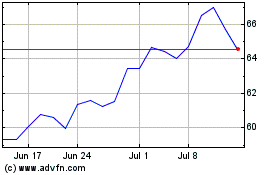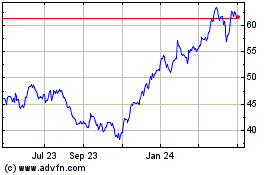Embattled Bank Stocks Lose Billions -- Update
August 14 2019 - 6:11PM
Dow Jones News
By Michael Wursthorn
Investors continued their run on bank stocks, sending shares of
some of America's biggest financial institutions sharply lower
following the latest sign of trouble ahead for the U.S.
economy.
A brief inversion of 10- and two-year U.S. Treasurys early
Wednesday sent shock waves through the stock market. Banks were
among the hardest hit, as investors worried whether the inversion
suggests a recession is likely.
Shares of JPMorgan Chase & Co., Morgan Stanley, Citigroup
Inc., Wells Fargo & Co., Bank of America Corp. and Goldman
Sachs Group Inc. all slid at least 3.3% Wednesday, outpacing the
broad S&P 500's 2.9% decline. Including Wednesday's losses,
those six banks have shed $136.7 billion in market-cap value since
the end of July.
Wednesday's move in bond yields raised alarms among investors
that the U.S. economy, which has been solid most of the year, is
faltering. A strong consumer, a robust labor market and low
inflation have underpinned the latest stretch of the economic
expansion, even as manufacturing activity and other goods producers
struggled.
Now, there are concerns that leg of support for the economy, and
the stock market, is on the verge of potentially floundering. The
inversion of 10- and two-year U.S. Treasurys has been a reliable
indicator of an eventual recession for the past 40 years, and
analysts say investors are increasingly factoring in the likelihood
banks will struggle in that kind of environment.
"It's a slide into something no one wants to see," said Mark
Lindbloom, a portfolio manager at Western Asset Management Co., of
the inversion. "The sentiment shifts among consumers are now the
unknown. Potentially a change there is how you could see a more
significant slowdown."
For banks, the move down in yields lowers interest rates,
compressing how much they can earn from lending. Even worse, a
broader economic slowdown would likely stifle lending activity, as
well as other bank services, further hitting their profits.
Investors aren't taking any chances, pushing shares of most
banks and financial institutions lower on Wednesday, so much so
that four of those six major banks are trading below their book
value. In other words, shares are now trading at a price that
doesn't fully reflect the assets on those banks' balance
sheets.
Bank of America, Goldman Sachs, Morgan Stanley and Citigroup all
traded below their forward-looking book values. Before this month,
only Citigroup had that distinction. Wells Fargo and JPMorgan
shares remain above their book values. But that could change if
shares remain under pressure this month.
Write to Michael Wursthorn at Michael.Wursthorn@wsj.com
(END) Dow Jones Newswires
August 14, 2019 17:56 ET (21:56 GMT)
Copyright (c) 2019 Dow Jones & Company, Inc.
Citigroup (NYSE:C)
Historical Stock Chart
From Mar 2024 to Apr 2024

Citigroup (NYSE:C)
Historical Stock Chart
From Apr 2023 to Apr 2024
